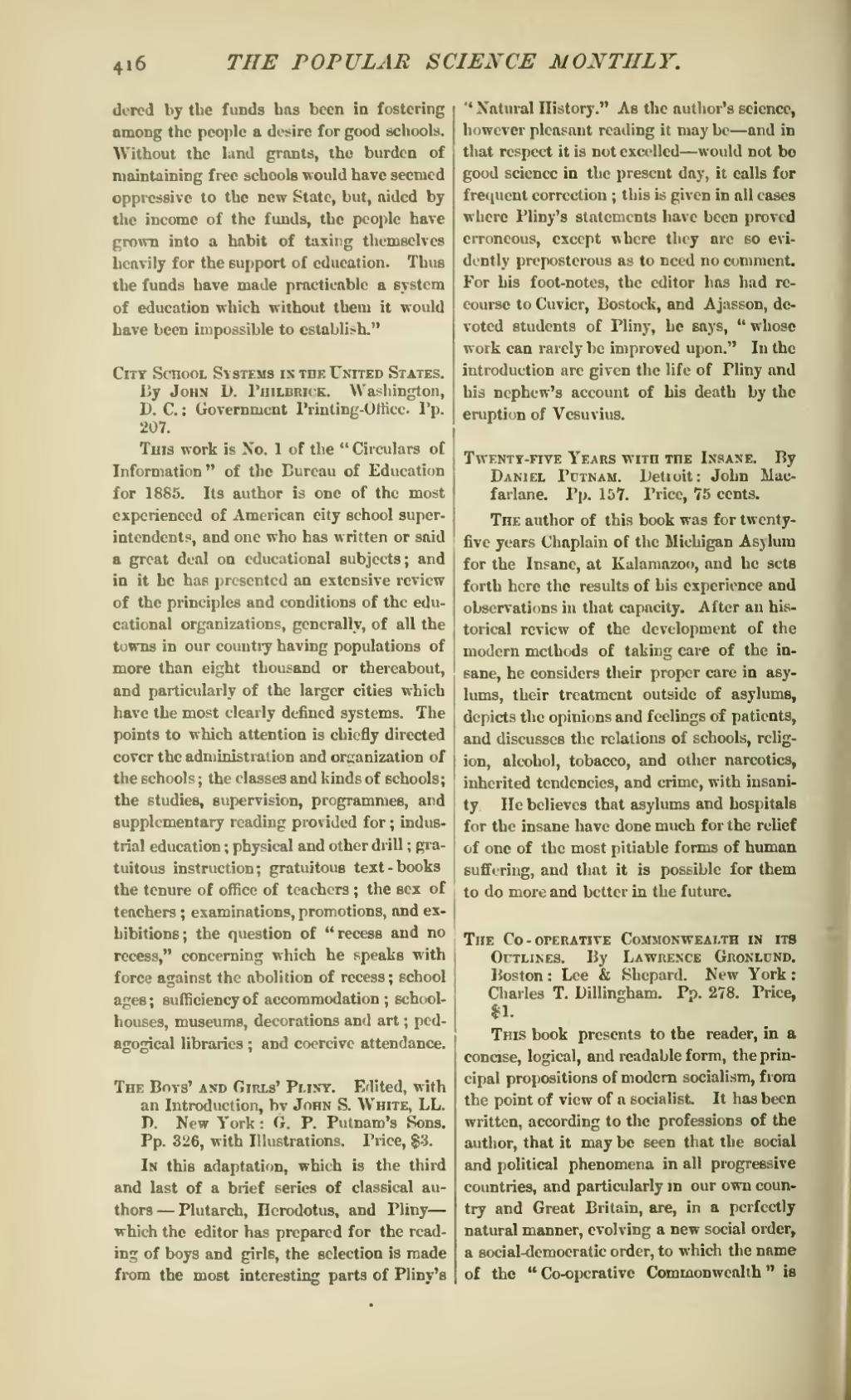dered by the funds has been in fostering among the people a desire for good schools. Without the land grants, the burden of maintaining free schools would have seemed oppressive to the new State, but, aided by the income of the funds, the people have grown into a habit of taxing themselves heavily for the support of education. Thus the funds have made practicable a system of education which without them it would have been impossible to establish."
City School Systems is the United States. By John D. Philbrick. Washington, D. C.: Government Printing-Office. Pp. 207.
This work is No. 1 of the "Circulars of Information" of the Bureau of Education for 1885. Its author is one of the most experienced of American city school superintendents, and one who has written or said a great deal on educational subjects; and in it he has presented an extensive review of the principles and conditions of the educational organizations, generally, of all the towns in our country having populations of more than eight thousand or thereabout, and particularly of the larger cities which have the most clearly defined systems. The points to which attention is chiefly directed cover the administration and organization of the schools; the classes and kinds of schools; the studies, supervision, programmes, and supplementary reading provided for; industrial education; physical and other drill; gratuitous instruction; gratuitous text-books the tenure of office of teachers; the sex of teachers; examinations, promotions, and exhibitions; the question of "recess and no recess," concerning which he speaks with force against the abolition of recess; school ages; sufficiency of accommodation; schoolhouses, museums, decorations and art; pedagogical libraries; and coercive attendance.
The Boys' and Girls' Pliny. Edited, with an Introduction, by John S. White, LL. D. New York: G. P. Putnam's Sons. Pp. 326, with Illustrations. Price, $3.
In this adaptation, which is the third and last of a brief series of classical authors—Plutarch, Herodotus, and Pliny—which the editor has prepared for the reading of boys and girls, the selection is made from the most interesting parts of Pliny's "Natural History." As the author's science, however pleasant reading it may be—and in that respect it is not excelled—would not be good science in the present day, it calls for frequent correction; this is given in all cases where Pliny's statements have been proved erroneous, except where they are so evidently preposterous as to need no comment. For his foot-notes, the editor has had recourse to Cuvier, Bostock, and Ajasson, devoted students of Pliny, he says, "whose work can rarely be improved upon." In the introduction are given the life of Pliny and his nephew's account of his death by the eruption of Vesuvius.
Twenty-five Years with the Insane. By Daniel Putnam. Detroit: John Macfarlane. Pp. 157. Price, 75 cents.
The author of this book was for twenty-five years Chaplain of the Michigan Asylum for the Insane, at Kalamazoo, and he seta forth here the results of his experience and observations in that capacity. After an historical review of the development of the modern methods of taking care of the insane, he considers their proper care in asylums, their treatment outside of asylums, depicts the opinions and feelings of patients, and discusses the relations of schools, religion, alcohol, tobacco, and other narcotics, inherited tendencies, and crime, with insanity. He believes that asylums and hospitals for the insane have done much for the relief of one of the most pitiable forms of human suffering, and that it is possible for them to do more and better in the future.
The Co-operative Commonwealth in its Outlines. By Lawrence Gronlund. Boston: Lee & Shepard. New York: Charles T. Dillingham. Pp. 278. Price, 81.
This book presents to the reader, in a concise, logical, and readable form, the principal propositions of modern socialism, from the point of view of a socialist. It has been written, according to the professions of the author, that it may be seen that the social and political phenomena in all progressive countries, and particularly in our own country and Great Britain, are, in a perfectly natural manner, evolving a new social order, a social-democratic order, to which the name of the "Co-operative Commonwealth" is
